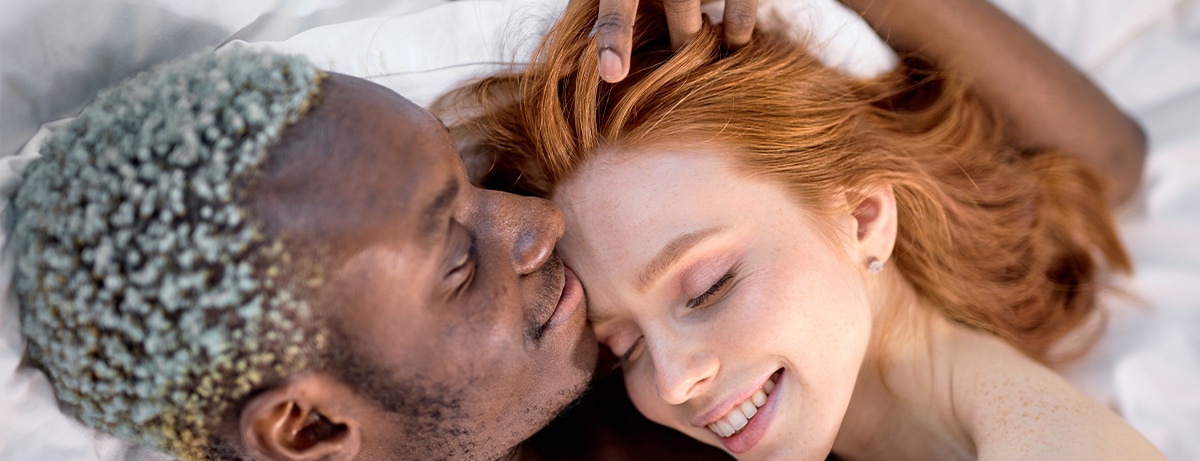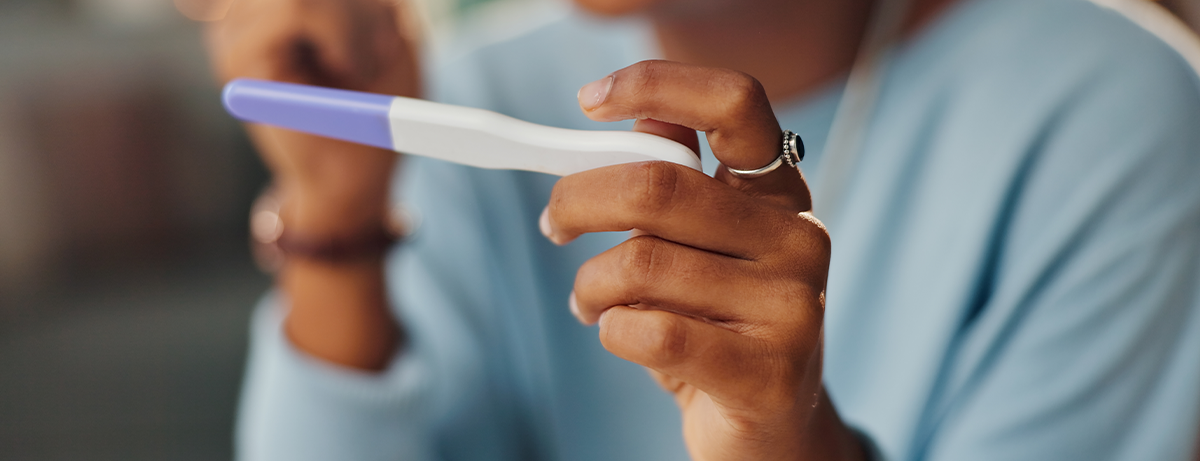15% off £25 or 20% off £35
Code:BASKET
Understanding fertility: when are you most fertile?

If you're planning to start a family, understanding your menstrual cycle and pinpointing your fertile window could increase your chances. Let's explore those important fertility facts
Summary
1When do you ovulate?
Everyone’s cycle is different, and it’s difficult to know exactly when ovulation occurs, but it usually happens in the middle of your menstrual cycle…
2When are you most fertile?
The actual number of fertile days varies from cycle to cycle and from woman to woman, but it typically includes the five days leading up to ovulation…
3Signs that you’re ovulating
Bloating, changes in cervical mucus, changes in body temperature and breast tenderness are all common signs and symptoms…
Your chances of getting pregnant are highest during the most fertile days of your menstrual cycle. This is during your ovulatory phase and the few days surrounding it, known as your ‘fertile window’.1-4
Let’s take a look at exactly when ovulation (when one of your ovaries releases an egg) happens and how to identify your most fertile days.
When do you ovulate?
Everyone’s cycle is different, and it’s difficult to know exactly when ovulation occurs, but it usually happens in the middle of your menstrual cycle, around 10 to 16 days before your next period.1,3,4
So, if your cycle is 28 days long, it’s likely you’ll ovulate and be most fertile on and around day 14 of your menstrual cycle.4 Remember this is only an example, so won't be the case for women whose cycles are shorter or longer.
What is the fertile window?
Have you ever come across the term ‘fertile window’? Not entirely sure what it means or when it occurs? Don’t worry, we’ve got you covered.
When are you most fertile?
The most fertile days of your cycle are those surrounding ovulation, a period known as your 'fertile window' when the egg is released.1,4
Your fertile window is made up of the days in your cycle when your chances of getting pregnant are at their highest.1-3 The actual number of fertile days varies from cycle to cycle and from woman to woman, but it typically includes the five days leading up to ovulation, the day of ovulation and the day after.2
If you’re trying to have a baby, making sure you have sex during your fertile window is the best way to boost your chances.1
When is my fertile window?
When your fertile window is depends on the length of your cycle.1
If your cycle is 28 days, you are likely to ovulate on day 14. Your fertile window will be the day of ovulation, the day after and the few days before.1,2,4
A helpful approach to understanding when your fertile window might be open could be to track your menstrual cycle and any associated symptoms.5 Some people find it useful to check and log their basal body temperature (BBT) every day or use ovulation predictor kits (more on this below).6
Check out why using a period tracker and at-home fertility tests may be a good idea in our dedicated articles.5
Can you only get pregnant when ovulating?
You’re most likely to get pregnant during your fertile window, but these are by no means the only days you can get pregnant.1,4 In fact, there’s a chance that you can get pregnant on any day of your cycle, but we’ll go into that a bit later.7
A released egg only lives for around 24 hours, but sperm can survive in the body for anywhere from three to seven days.2,8 This is why your fertile window lasts for five days before and one day after ovulation.2

Signs that you’re ovulating: how to know when you’re most fertile
Keeping track of your cycle is a great way to work out when you’re most likely to be ovulating and most fertile.5
There are common signs and symptoms which can help you identify ovulation too. These include:
- ovulation pain and bloating – you might experience mild pain in one side of your tummy that can last from a few minutes to a couple of days1,9
- changes in cervical mucus – just before ovulation, you may notice an increase in discharge and it will likely be thin and slippery, a bit like raw egg white. Just after ovulation, the amount of discharge decreases, and it becomes thicker1,10
- changes in body temperature – your BBT is your body’s temperature when fully at rest. During ovulation, your BBT rises by around 0.2°C and remains elevated until the end of your cycle. Monitoring your BBT by taking your temperature every morning as soon as you wake up can help you identify when you’re ovulating1,2,10
- breast tenderness – hormonal changes during ovulation cause some women to experience breast pain1,2
- light spotting – as well as more discharge, you may experience some light bleeding during ovulation9
Tracking your symptoms using a dedicated app can help you better predict when you’ll be ovulating. Using ovulation test strips and BBT thermometers can also help you pinpoint your most fertile days.
Curious to learn more about fertility testing? Read more about fertility tests in our complete guide.
Can you get pregnant on your period?
While it’s rare to get pregnant just before, during or just after your period, early ovulation and sperm longevity mean that it’s actually possible.8,11
There’s no time in your cycle when it’s impossible to get pregnant. So, if you want to avoid pregnancy, it’s important to use an effective method of contraception.11
When are you least fertile?
The least fertile times in your menstrual cycle are the days outside your fertile window, including the days after ovulation, during your period and right after your period.11,12
But, it's important to remember that sperm can survive for several days, so if you have sex without using contraception, it may be possible to get pregnant towards the end of your period if you ovulate early.
The final say
Understanding when you’re most fertile may help you maximise your chances of having a baby.
Remember that each person is unique, and what works for one may not work for another. If you have questions or want to discover some tips and insights on pre-conception, pregnancy and post-pregnancy, check out our pregnancy hub. If you have been struggling to get pregnant for a while, consult a healthcare professional for advice tailored to your individual fertility journey so they can check everything’s working as it should with you and your partner.
The advice in this article is for information only and should not replace medical care.
Please check with your GP or healthcare professional before trying any supplements,
treatments or remedies. Food supplements must not be used as a substitute for a
varied and balanced diet and a healthy lifestyle.
While we strive for accuracy and balance, please be aware that this article may discuss products available for purchase through Holland & Barrett. Consult a healthcare professional before making any health-related decisions.
1. Tommy’s. Ovulation and fertility [Internet]. [cited 2024 Oct 30]. Available from: https://www.tommys.org/pregnancy-information/planning-a-pregnancy/how-to-get-pregnant/ovulation-and-fertility
2. MSD Manuals. Menstrual cycle [Internet]. [cited 2024 Oct 30]. Available from: https://www.msdmanuals.com/home/women-s-health-issues/biology-of-the-female-reproductive-system/menstrual-cycle
3. British Fertility Society. When in the month are women and men most fertile? [Internet]. [cited 2024 Oct 30]. Available from: https://www.britishfertilitysociety.org.uk/fei/when-are-women-men-most-fertile/
4. NHS. Periods and fertility in the menstrual cycle [Internet]. [cited 2024 Oct 30]. Available from: https://www.nhs.uk/conditions/periods/fertility-in-the-menstrual-cycle/
5. Office on Women’s Health. Your menstrual cycle [Internet]. [cited 2024 Oct 30]. Available from: https://www.womenshealth.gov/menstrual-cycle/your-menstrual-cycle
6. MedlinePlus. Ovulation home test [Internet]. [cited 2024 Oct 30]. Available from: https://medlineplus.gov/ency/article/007062.htm
7. Tommy’s. Understanding your menstrual cycle [Internet]. [cited 2024 Oct 30]. Available from: https://www.tommys.org/pregnancy-information/planning-a-pregnancy/how-to-get-pregnant/understanding-your-menstrual-cycle
8. MedlinePlus. Pregnancy - identifying fertile days [Internet]. [cited 2024 Oct 30]. Available from: https://medlineplus.gov/ency/article/007015.htm
9. NHS. Ovulation pain [Internet]. [cited 2024 Oct 30]. Available from: https://www.nhs.uk/conditions/ovulation-pain/
10. American College of Obstetricians and Gynecologists. Fertility awareness-based methods of family planning [Internet]. [cited 2024 Oct 30]. Available from: https://www.acog.org/womens-health/faqs/fertility-awareness-based-methods-of-family-planning
11. SH:24. Can you get pregnant on your period? How likely is it? [Internet]. [cited 2024 Oct 30]. Available from: https://sh24.org.uk/help-centre/can-you-get-pregnant-on-your-period
12. Brook. Fertility awareness methods [Internet]. [cited 2024 Oct 30]. Available from: https://www.brook.org.uk/your-life/fertility-awareness-methods/














